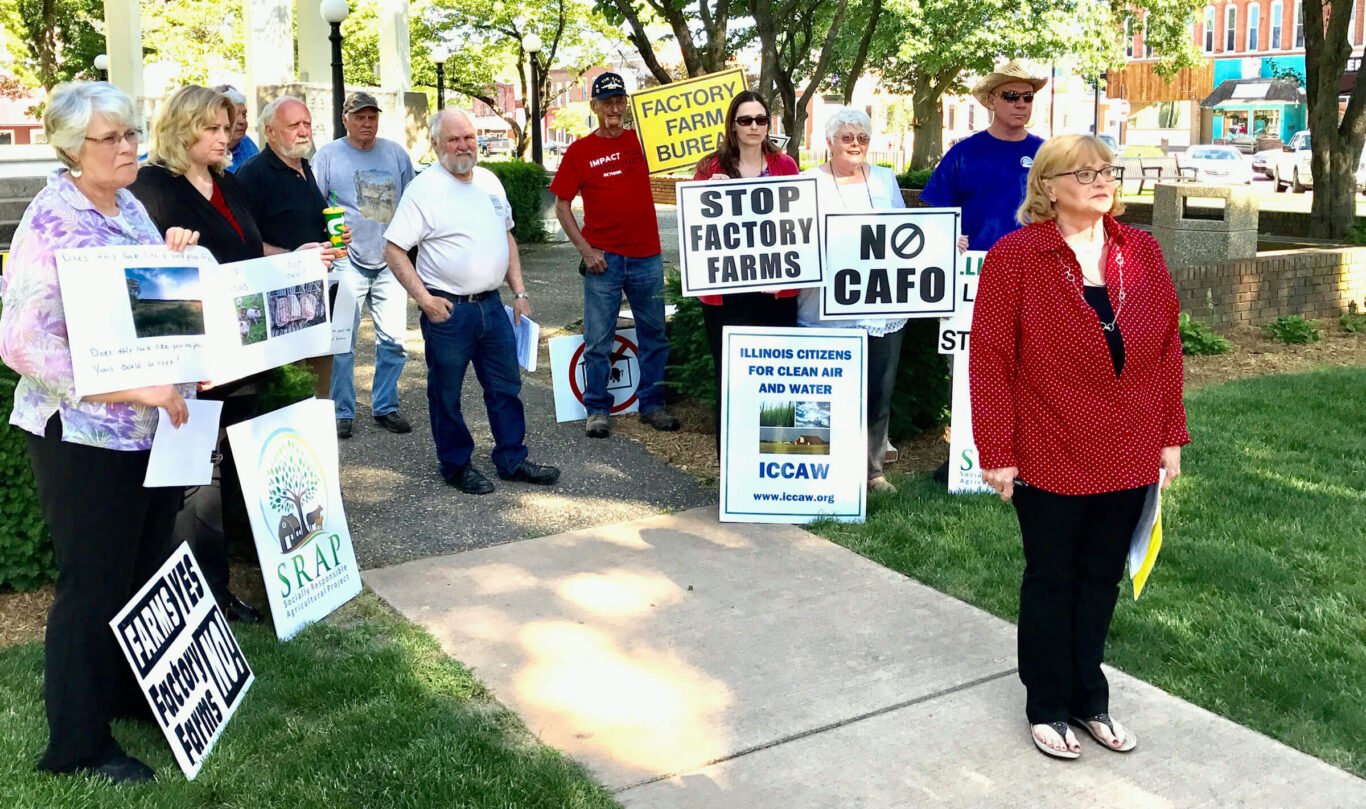Share
Let’s Kiss Factory Farms Goodbye
Happy Valentine’s Day from your friends at SRAP!
As we head into February, things are heating up in the fight against factory farms. This past month the SRAP team has kept busy in the field responding to calls for help through our SOS hotline from all over the country including: Missouri, Montana, Mississippi, South Dakota, and Utah.
In Iowa, the legislative season started off with a bang as a coalition of citizens and organizers rallied at the Iowa State Capitol calling for a moratorium against large-scale factory farm operations. The group is backing legislation introduced by Senator David Johnson to fix loopholes in Iowa’s code and is calling for a moratorium on new and expanding factory farms until there are fewer than 100 water impairments.
On the Eastern Shore, Millsboro residents are continuing to deal with the aftermath of groundwater pollution linked to Mountaire Farms’ local processing plant after Mountaire provided bottled water along with holiday wishes to neighbors this past December without explanation. Mountaire Farms addressed Millsboro residents’ concerns over high nitrates in residential wells in a recent meeting while claiming the contaminated wells are not their fault. Residents affected by the contaminated wells are now considering taking legal action. Meanwhile, residents in Wicomico County, Maryland who have been fighting against a poultry factory farm for two years have learned that the factory farm will not be breaking ground after all. After a long fought battle, the building permit for the proposed operation has finally expired. Congratulations to our friends in Wicomico County on this outstanding victory!
In Michigan, local residents are fighting off a 4,000-head pig factory near Lake Michigan. While nearby in Wisconsin, the State Department of Natural Resources recently approved restrictions on manure spreading in eastern Wisconsin.
As spring approaches, we remain optimistic and firmly committed to empowering communities working to protect themselves from the harmful impacts of industrial livestock production. We wish you a happy and healthy February as we continue to be inspired by all the communities and individuals who continue the good fight against factory farms.
In solidarity,
Kendra Kimbirauskas
Chief Executive Officer
&
Danielle Diamond
Executive Director
P.S. If you’d like to see specific issues covered in our newsletter, send suggestions to news@sraproject.org. You can read previous issues of our newsletter here.
Citizens Standing Up, Fighting Back: Bradley Olson
Bradley and Marsha Olson spent the past 40 years investing in a dream: 1,000 sprawling acres of wildlife habitat and farm land near Lake Hendricks in Brookings County, South Dakota. But just when they were finally ready to retire and build a home on their beloved acreage, they learned that a 4,000-head industrial dairy operation — also known as a concentrated animal feeding operation (CAFO) — was also planning to build just a half-mile away.
The Olsons began to wonder if their dream was over.
Two and a half years ago, I got a phone call. They said, ˜In four hours there’s gonna be a Planning and Zoning meeting to vote on putting in this CAFO.’ No one had any notice, but the word got out and we showed up fast. We begged, basically, for more time to organize. They went ahead and voted and passed it. I guess that’s what started it all.
Industrial Ag in the Driftless
In Wisconsin, we were proud to be a co-sponsor of the Industrial Ag in the Driftless Forum whichbrought together grassroots organizations and individuals affected by factory farms in the Driftless region and beyond. The event brought together over 300 attendees from five different states who networked and listened to panel discussions on factory farm related issues.
Our regional representative and Sustain Rural Wisconsin Network associate Mary Dougherty talked about the importance of defining a community’s values when confronting factory farms. Scott Dye, our regional representative from Missouri, traveled to the conference to share his experience of living next to an industrial hog farm and talked about some of the negative environmental impacts associated with factory farming. Renowned agricultural economist John Ikerd gave the keynote speech on how to defend rural communities from economic colonization by industrial agriculture. You can view the entire event here.
Upcoming Events:
Millsboro, Delaware, February 17th: The Sierra Club and the Delaware Concerned Citizens for Environmental Justice, along with SRAP and Protecting Our Indian River, are presenting an environmental justice workshop in Sussex County from 9AM to 1PM at the American Legion Hall in Millsboro, Post 28. The training will provide participants with an introduction and background on the history of environmental justice and environmental racism in America and Delaware. Find more information here.
Peoria, Illinois, February 24th: Illinois Citizens for Clean Air and Water (ICCAW) will be holding their annual meeting at the Kickapoo Creek Winery. Dr. John Ikerd will be the keynote speaker for the event. Also speaking are SRAP representative Craig Watts and Food & Water Watch’s Assistant Director, Patty Lovera. The event will include lunch and a wine tasting. For more information, email Karen Hudson.
Millsboro, Delaware, March 2nd: In Delaware a public meeting will be held at the Indian River Senior Center to discuss the density of the poulty industry in Sussex County. The meeting will include discussions on: nitrates and public well contamination, the geology of Sussex County, and environmental justice. Speakers will include: Dr. Robert Musil with the Rachel Carson Council, John Austin, leading national chemist expert, Judy Denver with the National Water Quality Assessment Progam, Dr. Sacoby Wilson with the University of Maryland School of Public Health, and Dr. Mohamed Akhtar, the former Executive Director of the American Public Health Association. For more information, email Maria Payan.
Ft Wayne, Indiana, March 16th: Dr. John Ikerd will be speaking at the IPFW Rhinehart Music Center on the impact of industrial farming on our environment and watersheds. This event will be free and open to the public. Find more information here.
Socially Responsible Agriculture Project

